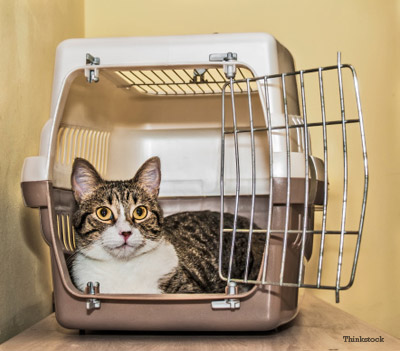
Dogs and humans aren’t the only ones who can suffer from car sickness or motion sickness. Cats can also develop gastrointestinal distress while traveling in the car, and for some, traveling by air or boat can induce the same reaction.
Symptoms of cat car sickness
Vomiting is, of course, the tell-tale sign of motion sickness. More subtle evidence that your feline friend is feeling queasy can include the following:
Cause of cat car sickness
Feline car or motion sickness may be associated with a super sensitive inner ear apparatus that regulates equilibrium and balance. Stress and anxiety caused by leaving the familiar home environment and being contained in a travel crate may be contributing factors. For some kitties motion sickness can become a conditioned response- the cat learns to associate car travel with nausea.
Tips for decreasing your cat’s car sickness
Although car sickness does not have any long-lasting health consequences, it is certainly a major drag for the poor cat and the poor human who must clean up the mess. If your cat experiences motion sickness from the car I encourage you to take advantage of the following suggestions with hopes that your car rides together will become far more peaceful and enjoyable.
- Begin by gradually acclimating your kitty to the travel crate or carrier you intend to use when traveling. This should begin inside the home. Ideally, leave the door to the carrier open and, when your cat spends time inside, provide plenty of highly desirable treats and toys.
- Graduate to having your cat spend time in the travel carrier while in the car, without the motor running. After several days of this, turn on the engine but don’t move the car. This can be followed by short road trips. Gradually build up car travel time, ideally winding up back at home, where your kitty will be rewarded. Keeping the car cool and playing music may provide some extra benefit.
- Place something in the crate that smells like home, such as a blanket or article of clothing.
- Facing forward may help prevent car sickness. Cover the crate in a fashion that prevents your cat from looking out, other than in a forward direction.
- Travel when your cat has an empty stomach (no food for 4-6 hours). This means skipping a meal or timing your travel according to your cat’s feeding schedule.
- Try a different car. Here you go- I am giving you a reason to go out and buy that new car you’ve had your eye on! Can you imagine the auto dealer’s reaction to taking your kitty along on test rides? In all seriousness, if you do have access to more than one vehicle, see if one produces a more favorable response for your cat than the other. I can attest to the fact that I am much more prone to motion sickness in some cars compared to others.
- Talk to your veterinarian about Cerenia (maropitant citrate), a drug that was developed specifically for the prevention of car/motion sickness in dogs. It is also safe and effective in cats. While Cerenia comes in a tablet form for dogs, it must be given as an injection under the skin in kitties. Many veterinarians are willing to teach their clients how to give injections. Cerenia works best when given one to two hours prior to travel.
- Over the counter medications developed for people with motion sickness are not as effective for cats as is Cerenia. Additionally, many of them can cause significant drowsiness. Do not use these products without first checking in with your veterinarian.
- Pheromone products can provide a calming effect for some cats. Get a recommendation for such a product from your veterinarian.
- Medications or remedies that reduce anxiety, such as Valium or rescue remedy, may provide benefit. Talk with your veterinarian about this option, and be sure to give the product a test run at home before using it for a car ride.
- Aromatherapy with lavender has been shown to significantly reduce car ride-induced anxiety in dogs, according to an AVMA article. While not tested in cats, this is certainly worth a try.
Questions to ask your veterinarian
- What do you recommend I try first for my cat’s motion sickness?
- Is there a medication that you suggest I try?
- If I want to try Cerenia, will you be willing to teach me how to give injections?
If you have any questions or concerns, you should always visit or call your veterinarian -- they are your best resource to ensure the health and well-being of your pets.
